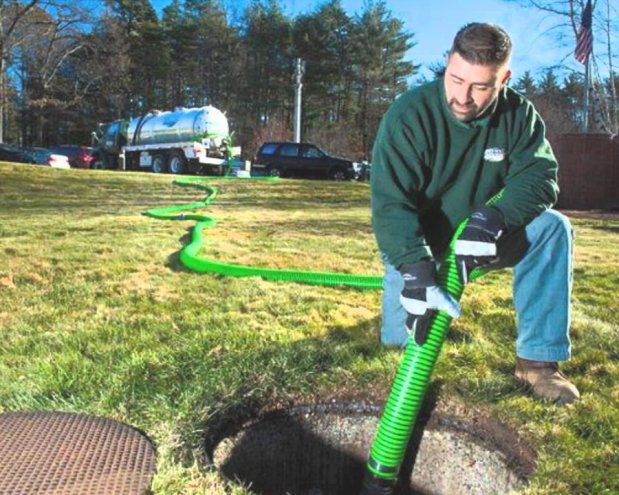
12
If you live in an area with sandy soil, you might wonder how that affects your septic system. Sandy soil is different from other soil types because it drains water quickly. Though that might sound appealing, sandy environments present unique challenges when installing septic tanks. Charlotte Septic Pros looks at how septic systems function in sandy environments and what you should know to keep everything operating efficiently.
A septic system is a way to treat wastewater when you aren’t connected to a city’s sewer system. Wastewater from your house flows into the septic tank, where solids settle to the bottom and form sludge. The liquid, called effluent, flows from the tank into the drain field and is filtered through the soil.
In most soils, bacteria in the ground help break down the waste in the effluent, cleaning it before it re-enters the water supply. However, sandy soil is much looser than other soil types, so the water moves through it faster.
One of the most significant issues with sandy soil is its quick drainage. In regular soil, water takes longer to filter, giving it more time to clean out harmful bacteria and contaminants. However, water drains too quickly in sandy soil for this natural process to work effectively.
If you have sandy soil, there are a few extra steps you can take to keep your septic system working efficiently. First, it’s essential to have your system inspected regularly by a septic company. Regular inspections can catch problems early before they become big, expensive repairs.
One of the most important things to do is schedule regular septic tank pumping. How often you need this depends on the size of your tank and how much wastewater your household produces, but a general rule is to have it done every 3 to 5 years. If you live in a sandy area, you may need to have it done more frequently, as the drain field could become overwhelmed faster due to the quick drainage.
If you’re installing a new septic system in sandy soil, it's important to work with professionals who understand your environment's unique challenges. Septic tank installation in sandy areas might require a few extra steps to ensure the system works correctly and efficiently.
Some systems feature unique designs, like mound systems. Instead of draining directly into the soil, waste enters an elevated area filled with sand or gravel instead. Other septic systems might use sand filters as part of their cleaning process to improve performance in sandy environments.
When installing a septic system on sandy soil, you must select an adequate tank size. A tank that's too small could quickly become overwhelmed with wastewater in an environment with rapid drainage rates; an experienced septic company can assist you in finding out exactly which size would work for your household.
Maintaining your septic system is critical in sandy environments. Since the soil might not filter the effluent as thoroughly as other soil types, you’ll need extra care to ensure everything works properly. Regular septic tank cleaning is one of the most important tasks for maintaining your system. Over time, sludge builds up at the bottom of the tank.
A professional should clean your septic tank to ensure proper cleaning and minimal damage to your system. They can inspect the tank for damage or wear and tear during the cleaning.
Septic tank repair in Huntersville might also be necessary from time to time. It’s best to take care of any needed septic tank repair as soon as possible to avoid costly fixes later.
It’s essential to know the signs that your septic system might need attention, especially if you live in sandy soil. If you notice slow drains, standing water near your drain field, or bad smells coming from your yard, it could be a sign that your septic system is failing. These are issues that should be addressed by a septic company right away.
Septic systems in sandy environments can face unique challenges because of how the soil drains. However, your system can continue functioning correctly with proper maintenance and regular care, like septic tank pumping, cleaning, and even occasional septic tank repair. Working with Charlotte Septic Pros can make all the difference. Whether installing a new septic system or maintaining an existing one, taking the proper steps now will keep your system running smoothly for years.

12
A single slow drain in your home can feel like a minor inconvenience. Maybe the sink takes a little longer…
Read more
05
Are Slow Drains a Septic Issue or Just a Clog? Slow drains are one of those household problems that start…
Read more
02
What Septic Service Techs See That Homeowners Miss Most homeowners only think about their septic system when something goes wrong.…
Read more
21
Simple Habits That Protect Your Septic System A well-functioning septic system does its job quietly, but the moment something goes…
Read more
14
Pump Now or Pay Later: The Real Cost of Skipping Maintenance A properly functioning septic system is easy to forget…
Read more
11
Why Your Septic System Always Acts Up at the Worst Time Homeowners often feel that septic problems strike at the…
Read more
04
Early Warning Signs Your Septic Tank Needs Pumping For homeowners who rely on a septic system, routine maintenance is not…
Read more
29
Why Does My Septic System Smell Fine One Day and Terrible the Next? If you own a home with a…
Read more
19
Is Your Septic System Overdue? Simple Home Checks You Can Do Today For many homeowners, the septic system is a…
Read more
13
5 Signs Your Septic Tank Is Overdue for Pumping Your septic system works quietly behind the scenes, managing wastewater from…
Read more